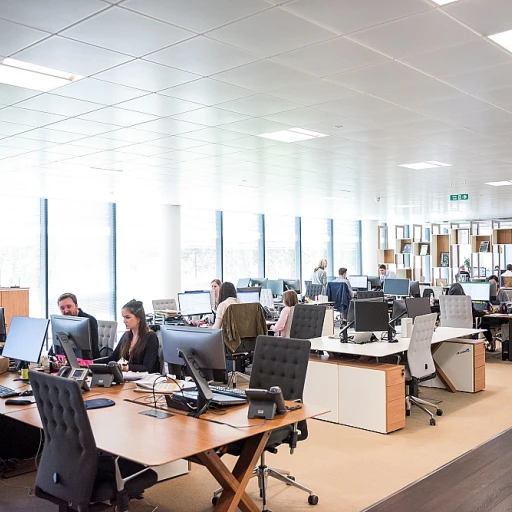
Understanding the Role of a Chief Human Resources Officer
Essential Contribution of CHRO in Retail
The role of a Chief Human Resources Officer (CHRO) in retail is pivotal for achieving both operational efficiency and long-term business success. At the heart of the CHRO's responsibilities lies the duty to align human resource strategies with business objectives, thus enabling organizations to maintain competitive advantages while effectively managing costs. The intricate balance of handling indirect procurement and direct costs through effective cost management strategies is critical to retail success.
A CHRO must be adept at developing approaches that enhance procurement processes and negotiate with suppliers to optimize cost savings. Superior inventory management is also under their purview, ensuring the right inventory levels without tying up excessive capital. Through strategic management initiatives, CHROs can reduce costs by fostering agile and adaptable processes, creating a resilient supply chain foundation.
The Influence of Advanced Technology and Data
Implementing cutting-edge technology and leveraging data insights is vital for CHROs aiming to enhance cost management. Efficient data utilization allows CHROs to understand spending patterns, identifying areas where indirect spend can be optimized. Not only does tech facilitate cost savings, but it also empowers strategic decision-making, ensuring HR initiatives align with the company's broader financial goals.
Procurement and Supplier Relationships
A chief human resources officer's role encompasses fostering productive relationships with suppliers to ensure both timely procurement and favorable terms. The goal is to manage both direct and indirect costs effectively while maintaining quality standards. By implementing procurement best practices, CHROs can achieve substantial cost reduction, directly impacting the company’s bottom line.
To explore specialized strategies that can further support the crafting of effective strategies for business units, visit our in-depth blog post for comprehensive insights. This serves as an essential foundation for any retail entity seeking to refine their HR-led cost management initiatives.
The Importance of Strategic Cost Management in Retail
Harnessing Workforce Intelligence for Retail Optimization
In the retail sector, the importance of strategic cost management cannot be overstated. It's not merely about slashing budgets or aggressively negotiating with suppliers; it's about adopting a comprehensive approach to effectively manage costs while aligning with broader business objectives. Leveraging workforce intelligence is a critical element in achieving this alignment. One of the most effective ways to manage costs strategically is through a keen understanding of data. This includes data on direct and indirect spend, procurement processes, and inventories. Having a robust system for tracking and analyzing these elements can significantly contribute to better decision-making, more effective cost management, and ultimately, cost savings.- Indirect Spend Management: Managing indirect procurement effectively can lead to substantial savings. Strategies like streamlining procurement processes, renegotiating supplier contracts, and optimizing the supply chain are vital for minimizing costs associated with indirect goods and services.
- Data-Driven Decisions: Using data to drive decisions allows businesses to identify trends and inefficiencies in procurement and inventory management. This can help in implementing cost-saving strategies more effectively.
- Supplier Relationships: Building partnerships with suppliers rather than mere transactional relationships can lead to better terms and more innovative solutions, aiding in cost reduction and improved value.
- Technology and Automation: Investing in technology to automate processes not only reduces direct costs associated with manual labor but also enhances efficiency and accuracy in cost management endeavors.
Aligning Human Resources with Business Strategy
Integrating Human Resources with Overall Business Goals
To optimize retail success, it is crucial for Human Resources (HR) to align closely with business strategy. This alignment ensures that the workforce is effectively driving towards the company’s objectives, particularly when executing cost management strategies. As the cornerstone of any business strategy, HR can take a proactive role in ensuring that indirect spend is managed judiciously.
HR can facilitate strategic changes by analyzing employee data to identify talent needs that can support cost-reduction initiatives. This involves integrating workforce planning with cost management strategies to ensure that the right skills are being deployed where needed. By doing so, HR not only reduces direct costs associated with overstaffing or mismatch in skill sets but also builds a more dynamic and adaptable workforce ready to meet business challenges.
In addition, HR plays a pivotal role in supplier and procurement processes. Through effective negotiation and relationship management with suppliers, HR can contribute to achieving cost savings in procurement, influencing the cost of goods and services procured. By implementing best practices in supplier management, such as regular audits and benchmarking, retailers can experience significant cost savings.
Furthermore, implementing effective technology solutions can streamline processes, allowing for better spend management. Technology enables the organization to track and analyze data on indirect costs, thereby providing a clearer picture of where reductions can be made. HR’s involvement in selecting and integrating these technology solutions can enhance the company’s ability to reduce costs in the long term. Ultimately, aligning HR efforts with the company’s strategic goals can lead to sustainable growth and effective cost management.
Implementing Indirect Cost Management Strategies
Integrating Cost Management Tactics in Retail Operations
In retail, managing indirect costs efficiently is critical for sustaining profitability. Indirect spend—encompassing non-product-related expenses like marketing, administration, and utility costs—can rapidly erode margins if left unchecked. Therefore, implementing effective cost management strategies is essential. One vital strategy involves leveraging data-driven insights to identify potential cost-saving opportunities. By analyzing spend data, businesses can pinpoint significant areas of indirect costs and strategize to reduce them. This approach can lead to considerable cost savings over the long term, easing the financial pressures retail companies often face.Procurement Process Optimization
Optimizing procurement processes is another effective strategy to reduce indirect costs. Engaging with suppliers strategically can yield better contract terms and discount opportunities, thus optimizing spend on goods and services. Establishing a robust supplier management framework ensures that procurement decisions align with business strategies, maximizing cost efficiencies. Standardizing procurement processes also enhances spend management. Automating procurement using technology solutions can streamline operations, reduce errors, and sustain cost savings. Businesses should aim to fortify their procurement processes by adopting best practices that suit their strategic needs.Unanticipated Challenges and Adaptive Strategies
Retailers often encounter challenges in managing both direct and indirect costs. Fluctuations in supplier pricing, demand shifts, and inventory management complexities require adaptive strategies to maintain operations smoothly. Implementing flexible cost management tactics allows companies to respond rapidly to these economic changes. For instance, regular evaluation of inventory management processes can reveal opportunities to reduce fixed costs associated with holding goods. Companies should routinely assess their supply chain strategies to ensure resilience against disruptions, enabling effective cost reduction. Finally, fostering a culture of continuous improvement across departments can drive efficiency. Encouraging cross-functional cooperation ensures that cost management efforts are sustained and align with the company's overarching strategic goals. Blending these strategic approaches helps retail businesses manage costs more effectively, enhancing overall performance and contributing to long-term success.Challenges in Retail Cost Management
Overcoming Retail Cost Management Hurdles
Retail businesses face a unique set of challenges when it comes to cost management. The dynamic nature of the industry, coupled with fluctuating consumer demands, requires a strategic approach to managing both direct and indirect costs. Effective cost management is crucial for maintaining profitability and ensuring long-term success.
One of the primary challenges is managing indirect spend, which includes costs related to procurement processes, supplier management, and inventory management. These costs can quickly add up, impacting the overall financial health of the company. Implementing effective strategies to reduce costs in these areas is essential.
- Supplier Relationships: Building strong relationships with suppliers can lead to better pricing and terms, ultimately reducing procurement costs. Regularly reviewing supplier contracts and negotiating terms can result in significant cost savings.
- Inventory Management: Efficient inventory management processes help in minimizing excess stock and reducing storage costs. Utilizing data-driven strategies to forecast demand can optimize inventory levels and reduce waste.
- Technology Integration: Leveraging technology for cost management can streamline processes and improve efficiency. Implementing systems for data analysis and spend management can provide insights into cost-saving opportunities.
Another challenge is aligning cost management strategies with the overall business strategy. This requires a comprehensive understanding of the company’s goals and objectives, ensuring that cost reduction efforts do not compromise the quality of goods and services offered.
Finally, the retail sector must navigate the complexities of fixed costs, such as rent and utilities, which can be difficult to reduce. Exploring alternative solutions, like renegotiating leases or investing in energy-efficient technologies, can help mitigate these expenses.
Addressing these challenges requires a strategic approach, focusing on both short-term cost reduction and long-term sustainability. By implementing best practices in cost management, retail businesses can enhance their competitive edge and drive success.













